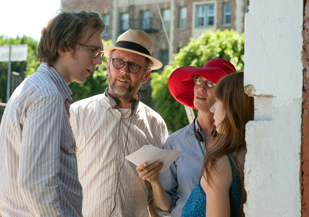|
|
BOP Interview: Valerie Faris & Jonathan DaytonBy Ryan MazieJuly 24, 2012
JD: It’s hard to know though where it is. I feel the tone when I read it, but that might be my projection immediately of the material. VF: That’s what happened with Little Miss Sunshine. A lot of people read that and saw it as a much broader comedy – kind of like European Vacation or something (laughs). JD: It was so nice to have Little Miss Sunshine out so people knew, “Oh that’s what you mean!” So when we approached this, Fox Searchlight knew how we approached material. VF: I think a big part of the tone comes from casting. If you cast the right people in the roles who can play their parts as real people, what real people would do more or less, that already ropes the tone in so you are not chasing after comedy or make things too dramatic. JD: We looked at a lot of comedians for the role of the brother that Chris Messina played, and they were really interesting… VF: They might have made the funny parts maybe funnier? JD: But what we needed was an actor who had the skills of someone like Chris, who could really deliver the credible questioning. He’s our advocate in the story, saying all of the things that we want to say, so when he accepts the premise, hopefully the audience does as well. You shot this movie digitally and you’ve done other work with film, so what’s your preference as directors? JD: We love film. VF: So much. JD: But we can’t ignore that digital media is here to stay. We worked very hard to get the most, let’s call it, “appropriate” look. We had to undo certain things that digital tends to give you, and yet in certain situations, digital was really incredible. We chose digital; we could have shot film. We figured since a lot of scenes were at night to capture Los Angeles in a certain way; say for example when we shot out the bedroom window and you can see the city lights twinkling, that was exciting. There were certain night scenes where we want to show Paul illuminated by the clock radio and we used an iPad as the sole illumination in the room.
|

|
|
|

|
Friday, November 1, 2024
© 2024 Box Office Prophets, a division of One Of Us, Inc.


